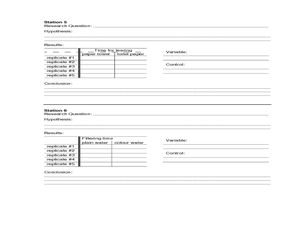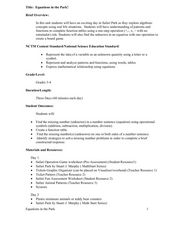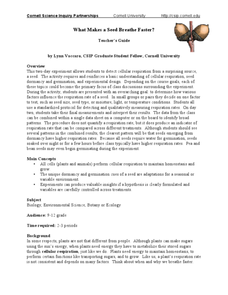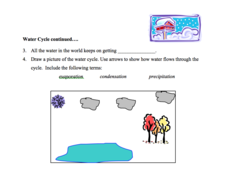Virginia Department of Education
Molar Heat of Fusion for Water
How can you describe heat of fusion in a way the class understands and relates the importance of this concept to present day issues? In this third lesson of the series, learners conduct an experiment, demonstrating the flow of heat...
Virginia Department of Education
Heat Transfer and Heat Capacity
It's time to increase the heat! Young chemists demonstrate heat transfer and heat capacity in an activity-packed lab, showing the transitions between solid, liquid, and gaseous phases of materials. Individuals plot data as the...
Virginia Department of Education
The Colligative Properties of Solutions
How can you relate colligative properties of solutions to everyday situations? Pupils first discuss the concepts of density, boiling and freezing points, then demonstrate how to accurately determine the boiling and freezing point of...
Virginia Department of Education
Partial Pressure
At some point, everyone has been under pressure—even Dalton! Explore Dalton's law of partial pressures with young chemists as they measure the volume of air extracted from a sample compared to its original volume. Class...
Virginia Department of Education
Radioactive Decay and Half-Life
Explain the importance of radioactive half-life as your high school biologists demonstrate the concept by performing a series of steps designed to simulate radioactive decay. Pupils use pennies to perform an experiment and gather data....
PBS
Scale City — Inverse Proportions and Shadows in the Real World
Bring the resource out from the shadows. Viewers of a short video learn about drive-in theaters and how operators project images onto a large screen. They then perform an experiment to determine the relationship between the distance of...
Curated OER
The Scientists’ Way
Students summarize the steps of the scientific method. In this life science lesson, students explain the importance of varying only one variable at a time. They analyze possible flaws in their experiment.
Curated OER
Experimental Design Reference
For this experimental design worksheet, students are given a full comprehensive outline for designing an experiment. There are checklists included for each section of the experiment for students to use as a guide for properly completing...
Curated OER
You Talkin' To Me?: Investigations in Animal Behavior
Students investigate a variety of animal behaviors, examine various modes of animal communication, and develop a catalog analyzing, interpreting, and reporting their results.
Curated OER
Slope of a Line
In this slope of a line worksheet, students read about line graphs and plotting the slope of a line. They read about the rate of change which is represented by the slope. Students practice finding the slope of lines.
Curated OER
Making Connections-Review Experimental Design and Homeostasis
In this experimental design and homeostasis worksheet, students complete 20 sentences with key terms about designing experiments, gathering data, graphing data and determining controls. They also complete sentences about homeostasis and...
Curated OER
Lego Robotics: Measuring Speed
Students build and program a LEGO robotic car as well as measure and graph its speed. They acquire familiarity with principles of construction, motion, design and problem solving. They compare a robot's speed over two different surfaces...
Curated OER
Conducting a Scientific Investigation
In this scientific investigation worksheet, young scholars answer 16 questions about conducting a scientific experiment on marble's and their velocity at different ramp heights. Students write a scientific question and then go through...
Curated OER
Equations in the Park
Young scholars explore algebraic concepts using real life situations. In this equations lesson, students develop strategies to solve missing number problems. Young scholars participate in a board game based on algebraic equations.
Curated OER
Evaluation Expressions
High schoolers explore algebraic expressions in this Algebra I lesson. They evaluate expressions using paper and pencil and then use the TI-83 to provide immediate reinforcements.
Curated OER
Filling the Glass (Water, Air, and Fractions)
Students predict which of two glasses is 1/2 full using visual estimation, height measurement, and liquid measurement methods. Mathematical equations to accurately solve the problem are determined and verified.
Curated OER
What Makes a Seed Breathe Faster?
Here's a five-star lesson plan in which inquisitors conduct sophisticated experimentation with cellular respiration in plant seeds. Placing seeds in a closed system they measure the amount carbon dioxide produced and relate it to...
Curated OER
Analysis of the Concentration of Sodium Chloride in a Product
Students design an experiment to test for the concentration of chloride in products. In this analysis of chloride concentration lesson plan, students develop and conduct an experiment to find the amount of chloride ion in a substance of...
Curated OER
Wind Power
What a wonderful way to explore wind power! Through this lesson, learners get a background in the history of wind power, create their own wind turbine, and the test their designs. This is a terrific way to tie scientific principles to...
Curated OER
Designing Experiments - Overview
Students explore the concepts that enable them to design and conduct sound scientific experiments. They critique a faulty experiment and become familiar with some of the criteria of a good experiment. They conduct their own experiment.
PHET
Planet Designer: Retro Planet Red
What does the atmosphere on Mars look like? This fourth instructional activity in the series of five is designed for high schoolers. Scholars apply previous knowledge to add atmosphere to Mars in an online simulation. This comprehensive...
Community Resources for Science
A Whole New World of DNA and Proteins
Lead your young scientists into an exciting world as they participate in a role play and experiment focused on proteins and DNA. After researching the Central Dogma of Biology, individuals or groups participate in a classroom...
PHET
Planet Designer: Martian Makeover
Mars used to have liquid water, can you make it come back? Use the activity and simulation to understand why Mars lost its magnetic field, why atmosphere is important, and what gravity has to do with it. This is the third...
Curated OER
Water, Water Everywhere!
Learners brainstorm on ways they use water, and where water comes from. They view video, Down the Drain, to gain specific facts about water use, properties of water, problems of water and the water cycle. They perform a lab activity...
Other popular searches
- Variables in Science
- Variables Science
- Science Variables Game
- Variables Science Quiz
- Catapults Science Variables
- Practicing Science Variables
- Identifying Science Variables
- Physical Science Variables
- Identifing Science Variables
- Science Variables Worksheets

























